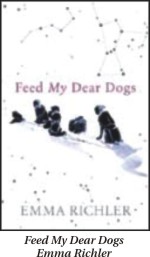|
Book
Review
Peeling
back the years
Elena
Seymenliyska
Jem Weiss,
a nine-year-old in a deerstalker hat, is the middle of five
children in a family that encourages enthusiasms. One of hers
is Sherlock Holmes and, like him, Jem appreciates the importance
of minutiae. Her family is another enthusiasm and she records,
in great detail, its characteristics, in-jokes and code words.
Weiss
1 is Ben, a scholarly, absent-minded boy with a gothic imagination.
Weiss 2 is Jude, her almost-twin and soul-mate, a strong,
silent type. Weiss 4 is Harriet, her arch and artistic little
sister, who likes to talk to animals and mimic Blanche DuBois.
And Weiss 5 is Gus, the children's favourite toy, a delicate,
asthmatic boy who quotes Saint-Exupéry.
 At
the head of the clan is Yaakov, a whisky-drinking, cigar-smoking
Jewish sportswriter who stomps through the house like a cowboy
and joyfully treats his children as personal slaves. Frances,
meanwhile, is the heart of the clan, a former model who reigns
over her brood with unflappable elegance, good humour and
saintly patience. Yaakov has a big thing for Frances, a love-blindness
verging on mania shared by all the children. At
the head of the clan is Yaakov, a whisky-drinking, cigar-smoking
Jewish sportswriter who stomps through the house like a cowboy
and joyfully treats his children as personal slaves. Frances,
meanwhile, is the heart of the clan, a former model who reigns
over her brood with unflappable elegance, good humour and
saintly patience. Yaakov has a big thing for Frances, a love-blindness
verging on mania shared by all the children.
"Big
thing" and "love-blindness" are just two of
the stock phrases peppered through Jem's narrative, together
with exclamations such as "Whoa!", "Yay!"
and "Bloody!" Film, song and book references are
another feature, with lines such as "It's a bad day at
Black Rock" and "Baby, it's cold outside" a
shorthand hiding layers of family meaning. Jem takes it upon
herself to uncover all these layers, meticulously recording
key events, such as the family's move from England to Canada,
as well as trivia such as her convent school's complex rules
on footwear.
The narrative
is as elaborate as the minutiae it describes. At its best,
it has a wonderful specificity: Jude smells "like rocks
with moss on them, like earth, sometimes like butter, and
often like bonfires or smoky bacon crisps"; the family
dog sits "in that wonky position he favours, meant to
mislead, one hip slung out to the side in a show of casual
behaviour". At its worst, it is logorrhoea gone rampant,
spoiling jokes, swamping descriptions and slowing the story's
flow.
Feed My
Dear Dogs is Emma Richler's second go at telling what is,
essentially, an autobiographical story. The daughter of the
Canadian Jewish author Mordecai Richler, she is the middle
child of a family of five and grew up in London and Montreal.
She worked as an actress for 10 years, training which reveals
itself in a knack for the telling gesture or the perfectly
delivered phrase. Her debut, Sister Crazy, was a much shorter,
sharper work, which introduced the Weiss family through a
series of closely observed vignettes. Many of these anecdotes
are recycled in this follow-up, padded out with references
to science, history, literature and religion (the first chapter
alone brings in Goebbels, Blake, Scott of the Antarctic, the
Apollo moon landings, the law of gravity and the structure
of the eye).
In both
books, Richler acts as guardian of her family's memories.
Her happy childhood is plagued by the awareness that, one
day, all this will come to an end. Like a female Peter Pan,
Jem doesn't want to grow up and returns again and again to
"the old things in their right places". But Richler
also has a deeply troubled adult narrator hovering at the
margins: Sister Crazy alludes to a nervous breakdown and a
filial fall-out; Feed My Dear Dogs is overshadowed by bereavement;
and both feature brief, opaque exchanges with an analyst.
"Forgetting
is exile," Jem notes at the close of this novel. "I
remember everything. I will not be a stranger in a strange
land." The only problem is that Richler remembers too
much.
This review was first
published in the Guardian
Copyright (R)
thedailystar.net 2004
|
